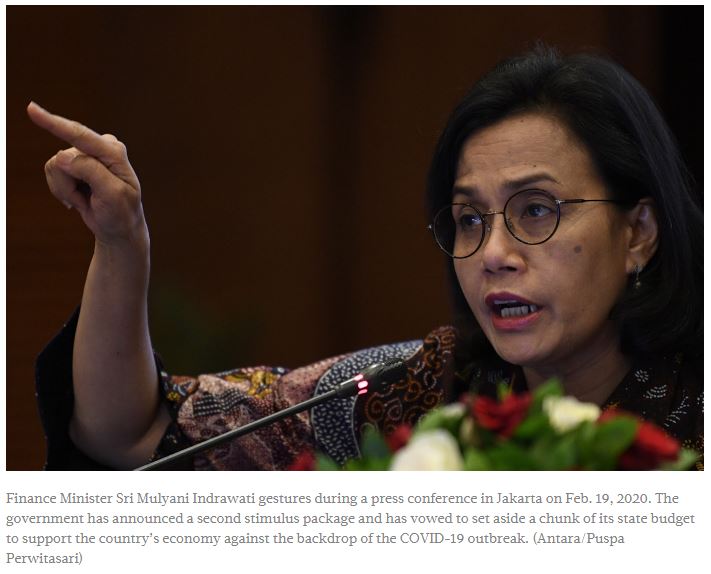Indonesia deploys second stimulus amid market, rupiah routs
Indonesia has officially announced a second stimulus package and has vowed to set aside a chunk of its state budget to support the country’s economy against the backdrop of the COVID-19 outbreak, providing some relief to a battered stock market and rupiah.
The government announced on Friday that it would allocate Rp 120 trillion (US$8.1 billion) from the state budget to stimulate the economy by providing tax incentives and subsidies for workers, businesses and families affected by the pandemic.
It has also deployed a second stimulus package, worth Rp 22.9 trillion, which includes individual and corporate tax breaks, as well as a relaxation of loan disbursements and restructuring requirements.
Manufacturing workers with incomes below Rp 200 million per year would be exempt from paying income taxes for six months. The government has also cut the corporate income tax rate by 30 percent for six months and deferred import tax payments for six months for 19 manufacturing industries. It will also speed up repayments of overpaid taxes without an audit.
“This will not be the last announcement, as the developments have been extremely dynamic,” Finance Minister Sri Mulyani Indrawati told a press briefing in Jakarta. “We will assess the situation to mitigate and minimize the impacts. We cannot eradicate the impacts, but we can minimize them for corporations and the public.”
The new measures add to the first Rp 10.3 trillion stimulus package announced on Feb. 25, which provided mortgage subsidies for low-income families and fiscal incentives for travel-related industries. The government will also speed up the disbursement of social spending in the first quarter and subsidies for the preemployment card program this month.
The announcement on Friday came as governments and central banks around the world announced fiscal stimuli and monetary easing policies, following a historic global financial market rout spurred by fears over the COVID-19 pandemic.
The Jakarta Composite Index (JCI) hit circuit breakers just 15 minutes into Friday’s session as stocks crashed by more than 5 percent. Trading was also suspended on Thursday, 30 minutes before it was scheduled to end
The main gauge started to rebound after the government’s stimulus announcement and closed Friday’s trading 0.24 percent higher at 4,907.57.
The rupiah fell more than 2 percent to a 16-month low on Friday, before slowly getting back on its feet and closing the day with a 1.76-percent depreciation at 14,777 per US dollar.
On the same day, the government also unveiled a non-fiscal stimulus package that includes a reduction in the number of goods prohibited for imports, as well as the acceleration of export and import processing and licensing, especially for reputable traders.
The policy will reduce the number of export restrictions, omitting the requirement to provide a health certificate and V-Legal documents unless mandated by importing countries. Similarly, it will scrap 749 harmonized system (HS) codes, consisting of 443 HS codes for fish and fish products and 306 for forestry products.
The stimulus will reduce and simplify restrictions for producers who import steel, alloy steel and its derivatives, as well as several food commodities to ensure the availability of raw materials.
The government has also vowed to simplify regulations for animal, medicine and food imports.
In addition, local authorities will incentivize “reputable traders” that have a “high level of compliance” by automatically responding to and approving applications for restricted exports and imports, as well as removing surveyor report requirements for mandatory commodities.
The government will also beef up its supervision through the National Logistics Ecosystem (NLE), a platform that integrates information systems between the government and the private sector. Particularly, the NLE plans to integrate information from the government’s export-import licensing website Indonesia National Single Window (INSW) with Indonesia’s port system (Inaport), the Trade Ministry’s online trade system (Inatrade), Customs-Excise Information System and Automation (CEISA), trucking systems, warehouse systems, transportation systems and terminal operator systems, among other systems.
Center of Reform on Economics (Core) director Mohammad Faisal said that while he appreciated the additional efforts, he noted that the government would be unable to depend on its slew of stimulus measures if it did not stimulate weak demand.
Bank Central Asia (BCA) chief economist David Sumual expressed a similar view, saying the government would need to roll out a larger stimulus package as COVID-19 had also affected sectors other than manufacturing.
“The most important thing is to maintain people’s purchasing power and therefore, the stimulus should be broadened to other sectors as well,” he said, urging the government to raise the threshold of non-taxable income, something done during the 2008 financial crisis.
Indonesian Chamber of Commerce and Industry (Kadin) export development vice chairman Handito Joewono demanded a more comprehensive policy involving all parts of the supply chain and covering all sides of businesses.
Source: https://www.thejakartapost.com/news/2020/03/16/indonesia-deploys-second-stimulus-amid-market-rupiah-routs.html


 English
English




